NHS Crisis: COVID-19 Impact, Challenges, and Healthcare Management
VerifiedAdded on 2022/12/15
|8
|2484
|203
Report
AI Summary
This report examines the crisis within the National Health Service (NHS) in the UK, primarily focusing on the impact of the COVID-19 pandemic. It details how the sudden surge in COVID-19 cases placed immense pressure on healthcare services, leading to increased demand for healthcare professionals, resources, and facilities. The report highlights the challenges faced, including staff shortages, burnout, and the strain on hospital facilities, particularly intensive care units (ICUs). It explores the consequences of these pressures, such as delays in patient admissions, long waiting times, and the disruption of non-COVID related healthcare services. Additionally, the report discusses the role of media coverage in shaping public perception of the crisis and its impact on healthcare management strategies. It concludes by emphasizing the critical need for effective management, adequate resources, and further research to address the ongoing challenges and mitigate the impact of future crises on the NHS. The report also stresses the importance of government support, effective healthcare guidelines and home care practices.
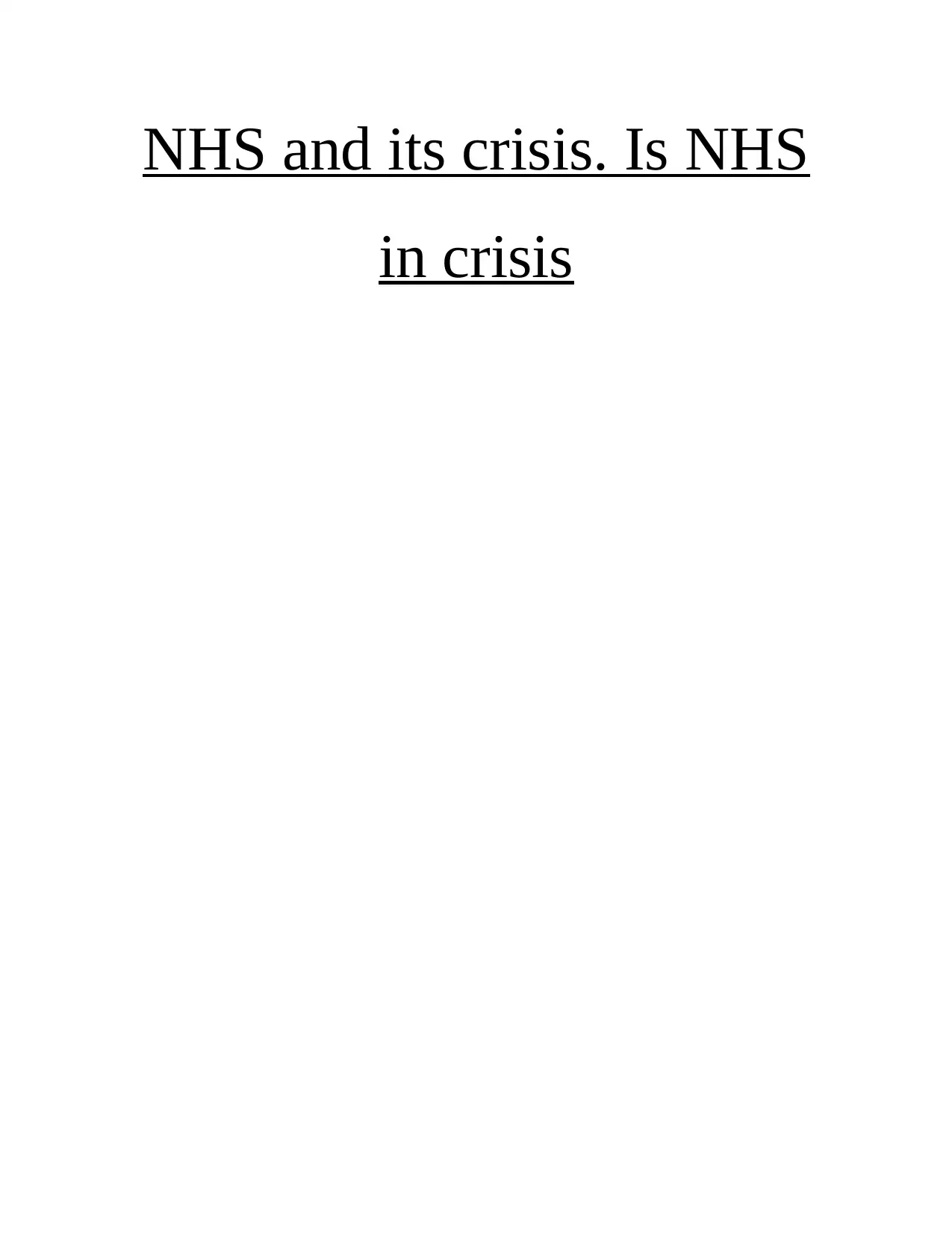
NHS and its crisis. Is NHS
in crisis
in crisis
Paraphrase This Document
Need a fresh take? Get an instant paraphrase of this document with our AI Paraphraser
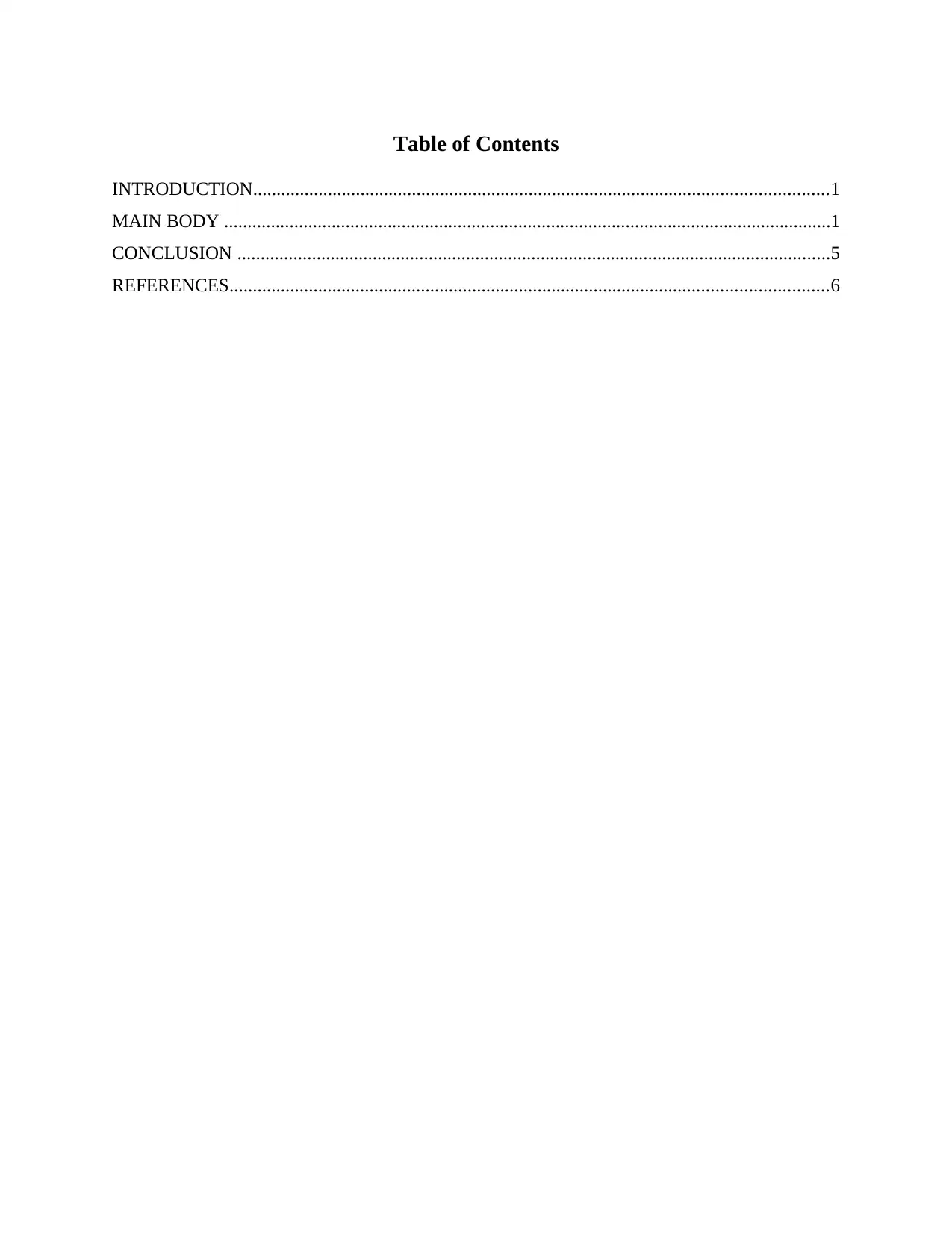
Table of Contents
INTRODUCTION...........................................................................................................................1
MAIN BODY ..................................................................................................................................1
CONCLUSION ...............................................................................................................................5
REFERENCES................................................................................................................................6
INTRODUCTION...........................................................................................................................1
MAIN BODY ..................................................................................................................................1
CONCLUSION ...............................................................................................................................5
REFERENCES................................................................................................................................6
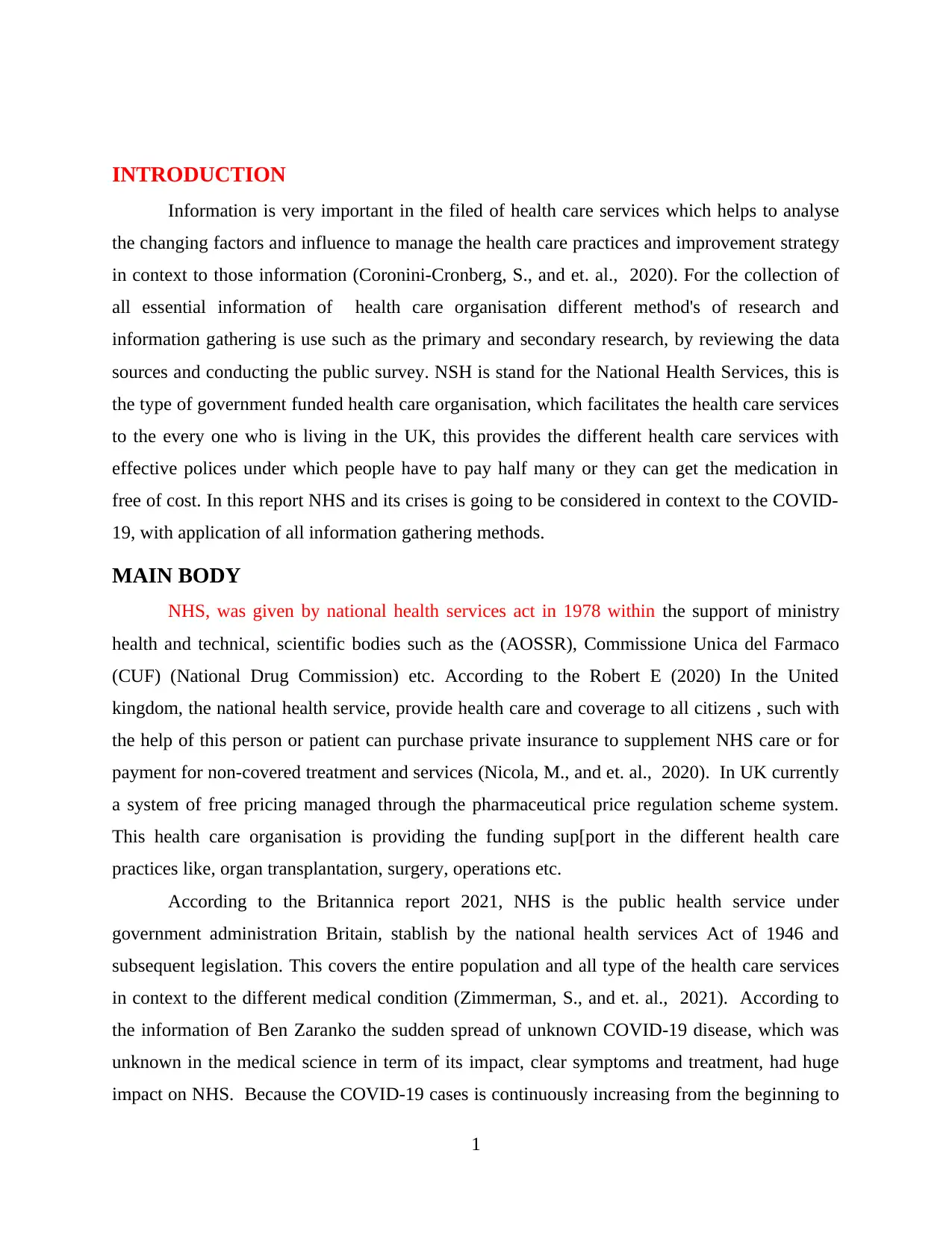
INTRODUCTION
Information is very important in the filed of health care services which helps to analyse
the changing factors and influence to manage the health care practices and improvement strategy
in context to those information (Coronini-Cronberg, S., and et. al., 2020). For the collection of
all essential information of health care organisation different method's of research and
information gathering is use such as the primary and secondary research, by reviewing the data
sources and conducting the public survey. NSH is stand for the National Health Services, this is
the type of government funded health care organisation, which facilitates the health care services
to the every one who is living in the UK, this provides the different health care services with
effective polices under which people have to pay half many or they can get the medication in
free of cost. In this report NHS and its crises is going to be considered in context to the COVID-
19, with application of all information gathering methods.
MAIN BODY
NHS, was given by national health services act in 1978 within the support of ministry
health and technical, scientific bodies such as the (AOSSR), Commissione Unica del Farmaco
(CUF) (National Drug Commission) etc. According to the Robert E (2020) In the United
kingdom, the national health service, provide health care and coverage to all citizens , such with
the help of this person or patient can purchase private insurance to supplement NHS care or for
payment for non-covered treatment and services (Nicola, M., and et. al., 2020). In UK currently
a system of free pricing managed through the pharmaceutical price regulation scheme system.
This health care organisation is providing the funding sup[port in the different health care
practices like, organ transplantation, surgery, operations etc.
According to the Britannica report 2021, NHS is the public health service under
government administration Britain, stablish by the national health services Act of 1946 and
subsequent legislation. This covers the entire population and all type of the health care services
in context to the different medical condition (Zimmerman, S., and et. al., 2021). According to
the information of Ben Zaranko the sudden spread of unknown COVID-19 disease, which was
unknown in the medical science in term of its impact, clear symptoms and treatment, had huge
impact on NHS. Because the COVID-19 cases is continuously increasing from the beginning to
1
Information is very important in the filed of health care services which helps to analyse
the changing factors and influence to manage the health care practices and improvement strategy
in context to those information (Coronini-Cronberg, S., and et. al., 2020). For the collection of
all essential information of health care organisation different method's of research and
information gathering is use such as the primary and secondary research, by reviewing the data
sources and conducting the public survey. NSH is stand for the National Health Services, this is
the type of government funded health care organisation, which facilitates the health care services
to the every one who is living in the UK, this provides the different health care services with
effective polices under which people have to pay half many or they can get the medication in
free of cost. In this report NHS and its crises is going to be considered in context to the COVID-
19, with application of all information gathering methods.
MAIN BODY
NHS, was given by national health services act in 1978 within the support of ministry
health and technical, scientific bodies such as the (AOSSR), Commissione Unica del Farmaco
(CUF) (National Drug Commission) etc. According to the Robert E (2020) In the United
kingdom, the national health service, provide health care and coverage to all citizens , such with
the help of this person or patient can purchase private insurance to supplement NHS care or for
payment for non-covered treatment and services (Nicola, M., and et. al., 2020). In UK currently
a system of free pricing managed through the pharmaceutical price regulation scheme system.
This health care organisation is providing the funding sup[port in the different health care
practices like, organ transplantation, surgery, operations etc.
According to the Britannica report 2021, NHS is the public health service under
government administration Britain, stablish by the national health services Act of 1946 and
subsequent legislation. This covers the entire population and all type of the health care services
in context to the different medical condition (Zimmerman, S., and et. al., 2021). According to
the information of Ben Zaranko the sudden spread of unknown COVID-19 disease, which was
unknown in the medical science in term of its impact, clear symptoms and treatment, had huge
impact on NHS. Because the COVID-19 cases is continuously increasing from the beginning to
1
⊘ This is a preview!⊘
Do you want full access?
Subscribe today to unlock all pages.

Trusted by 1+ million students worldwide
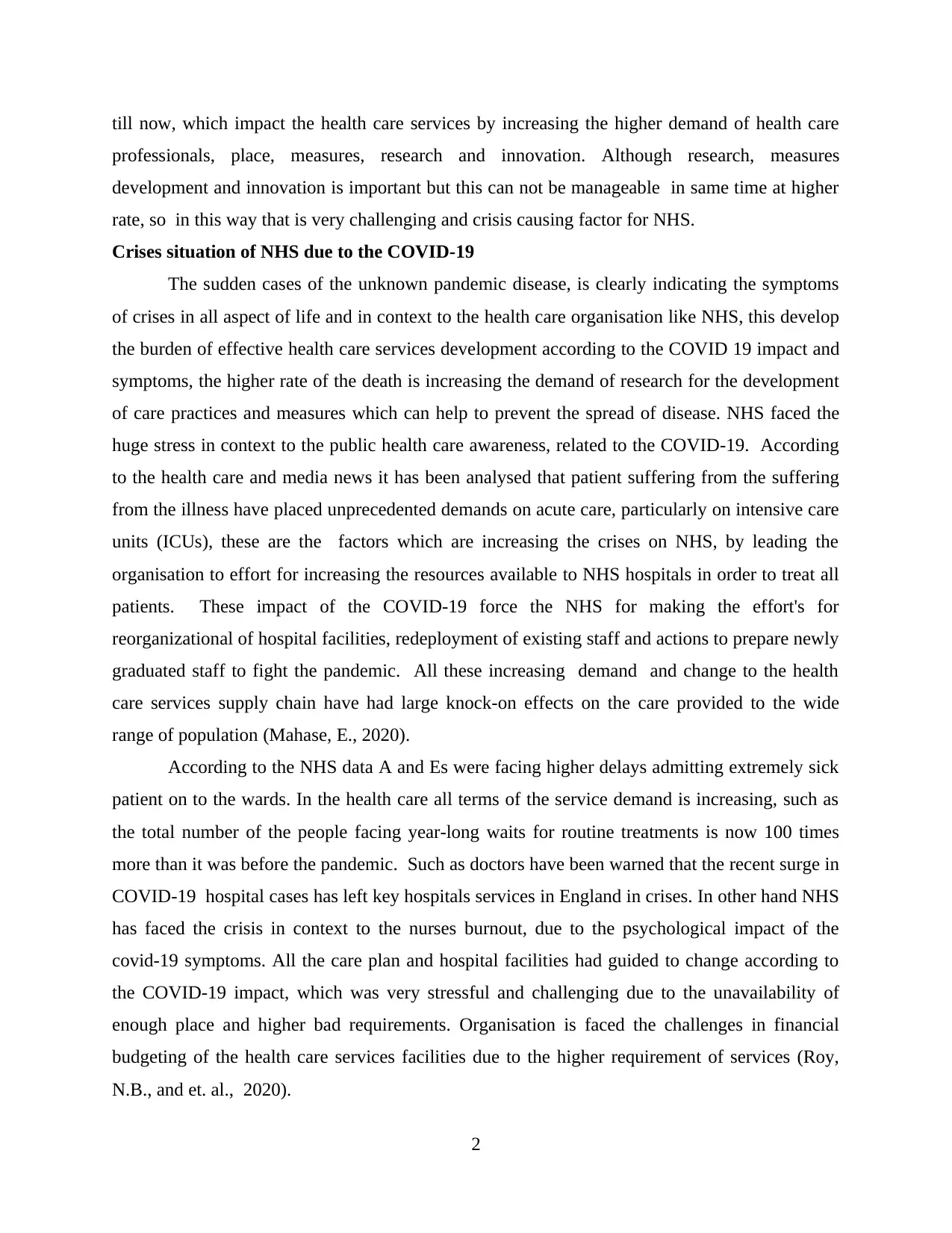
till now, which impact the health care services by increasing the higher demand of health care
professionals, place, measures, research and innovation. Although research, measures
development and innovation is important but this can not be manageable in same time at higher
rate, so in this way that is very challenging and crisis causing factor for NHS.
Crises situation of NHS due to the COVID-19
The sudden cases of the unknown pandemic disease, is clearly indicating the symptoms
of crises in all aspect of life and in context to the health care organisation like NHS, this develop
the burden of effective health care services development according to the COVID 19 impact and
symptoms, the higher rate of the death is increasing the demand of research for the development
of care practices and measures which can help to prevent the spread of disease. NHS faced the
huge stress in context to the public health care awareness, related to the COVID-19. According
to the health care and media news it has been analysed that patient suffering from the suffering
from the illness have placed unprecedented demands on acute care, particularly on intensive care
units (ICUs), these are the factors which are increasing the crises on NHS, by leading the
organisation to effort for increasing the resources available to NHS hospitals in order to treat all
patients. These impact of the COVID-19 force the NHS for making the effort's for
reorganizational of hospital facilities, redeployment of existing staff and actions to prepare newly
graduated staff to fight the pandemic. All these increasing demand and change to the health
care services supply chain have had large knock-on effects on the care provided to the wide
range of population (Mahase, E., 2020).
According to the NHS data A and Es were facing higher delays admitting extremely sick
patient on to the wards. In the health care all terms of the service demand is increasing, such as
the total number of the people facing year-long waits for routine treatments is now 100 times
more than it was before the pandemic. Such as doctors have been warned that the recent surge in
COVID-19 hospital cases has left key hospitals services in England in crises. In other hand NHS
has faced the crisis in context to the nurses burnout, due to the psychological impact of the
covid-19 symptoms. All the care plan and hospital facilities had guided to change according to
the COVID-19 impact, which was very stressful and challenging due to the unavailability of
enough place and higher bad requirements. Organisation is faced the challenges in financial
budgeting of the health care services facilities due to the higher requirement of services (Roy,
N.B., and et. al., 2020).
2
professionals, place, measures, research and innovation. Although research, measures
development and innovation is important but this can not be manageable in same time at higher
rate, so in this way that is very challenging and crisis causing factor for NHS.
Crises situation of NHS due to the COVID-19
The sudden cases of the unknown pandemic disease, is clearly indicating the symptoms
of crises in all aspect of life and in context to the health care organisation like NHS, this develop
the burden of effective health care services development according to the COVID 19 impact and
symptoms, the higher rate of the death is increasing the demand of research for the development
of care practices and measures which can help to prevent the spread of disease. NHS faced the
huge stress in context to the public health care awareness, related to the COVID-19. According
to the health care and media news it has been analysed that patient suffering from the suffering
from the illness have placed unprecedented demands on acute care, particularly on intensive care
units (ICUs), these are the factors which are increasing the crises on NHS, by leading the
organisation to effort for increasing the resources available to NHS hospitals in order to treat all
patients. These impact of the COVID-19 force the NHS for making the effort's for
reorganizational of hospital facilities, redeployment of existing staff and actions to prepare newly
graduated staff to fight the pandemic. All these increasing demand and change to the health
care services supply chain have had large knock-on effects on the care provided to the wide
range of population (Mahase, E., 2020).
According to the NHS data A and Es were facing higher delays admitting extremely sick
patient on to the wards. In the health care all terms of the service demand is increasing, such as
the total number of the people facing year-long waits for routine treatments is now 100 times
more than it was before the pandemic. Such as doctors have been warned that the recent surge in
COVID-19 hospital cases has left key hospitals services in England in crises. In other hand NHS
has faced the crisis in context to the nurses burnout, due to the psychological impact of the
covid-19 symptoms. All the care plan and hospital facilities had guided to change according to
the COVID-19 impact, which was very stressful and challenging due to the unavailability of
enough place and higher bad requirements. Organisation is faced the challenges in financial
budgeting of the health care services facilities due to the higher requirement of services (Roy,
N.B., and et. al., 2020).
2
Paraphrase This Document
Need a fresh take? Get an instant paraphrase of this document with our AI Paraphraser
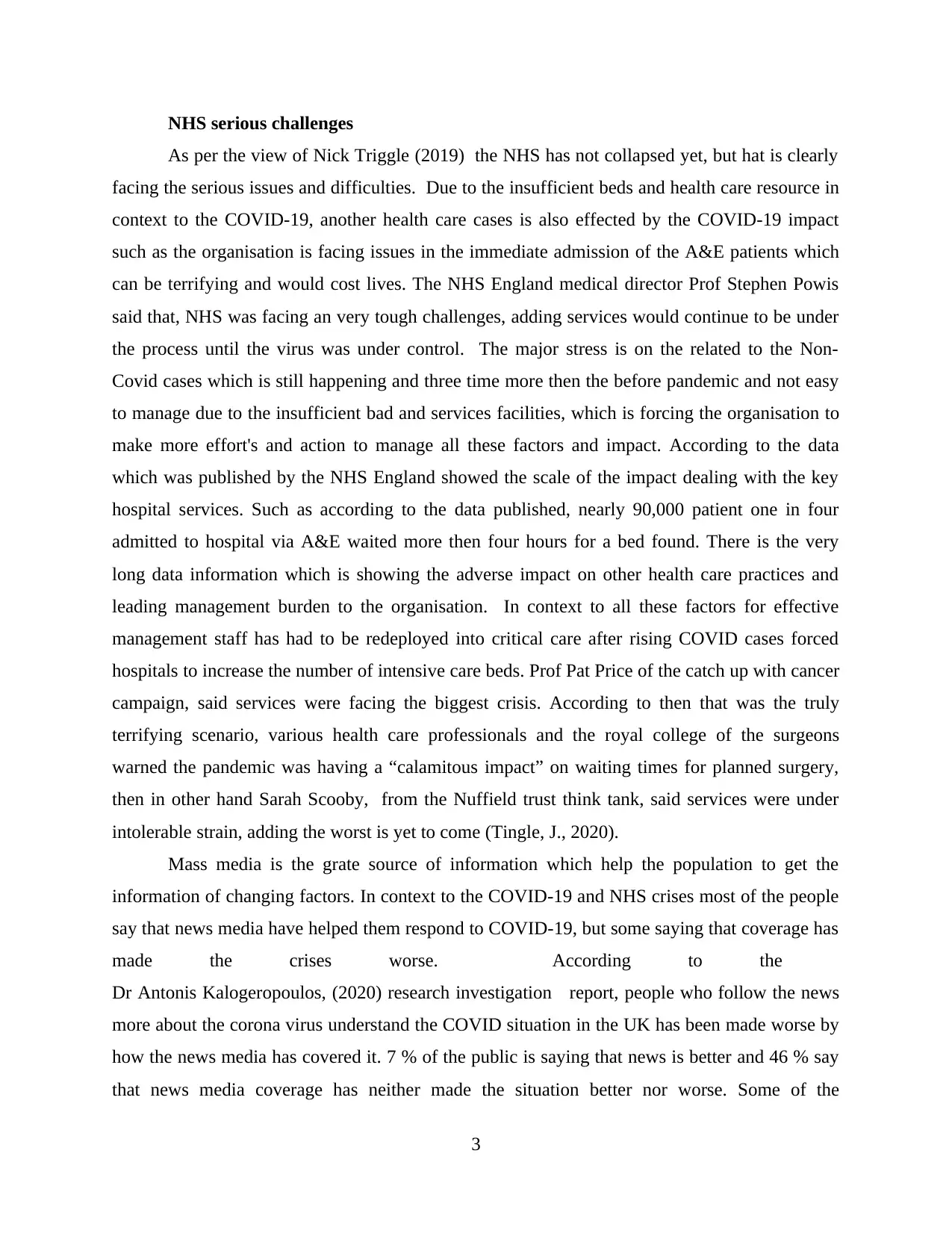
NHS serious challenges
As per the view of Nick Triggle (2019) the NHS has not collapsed yet, but hat is clearly
facing the serious issues and difficulties. Due to the insufficient beds and health care resource in
context to the COVID-19, another health care cases is also effected by the COVID-19 impact
such as the organisation is facing issues in the immediate admission of the A&E patients which
can be terrifying and would cost lives. The NHS England medical director Prof Stephen Powis
said that, NHS was facing an very tough challenges, adding services would continue to be under
the process until the virus was under control. The major stress is on the related to the Non-
Covid cases which is still happening and three time more then the before pandemic and not easy
to manage due to the insufficient bad and services facilities, which is forcing the organisation to
make more effort's and action to manage all these factors and impact. According to the data
which was published by the NHS England showed the scale of the impact dealing with the key
hospital services. Such as according to the data published, nearly 90,000 patient one in four
admitted to hospital via A&E waited more then four hours for a bed found. There is the very
long data information which is showing the adverse impact on other health care practices and
leading management burden to the organisation. In context to all these factors for effective
management staff has had to be redeployed into critical care after rising COVID cases forced
hospitals to increase the number of intensive care beds. Prof Pat Price of the catch up with cancer
campaign, said services were facing the biggest crisis. According to then that was the truly
terrifying scenario, various health care professionals and the royal college of the surgeons
warned the pandemic was having a “calamitous impact” on waiting times for planned surgery,
then in other hand Sarah Scooby, from the Nuffield trust think tank, said services were under
intolerable strain, adding the worst is yet to come (Tingle, J., 2020).
Mass media is the grate source of information which help the population to get the
information of changing factors. In context to the COVID-19 and NHS crises most of the people
say that news media have helped them respond to COVID-19, but some saying that coverage has
made the crises worse. According to the
Dr Antonis Kalogeropoulos, (2020) research investigation report, people who follow the news
more about the corona virus understand the COVID situation in the UK has been made worse by
how the news media has covered it. 7 % of the public is saying that news is better and 46 % say
that news media coverage has neither made the situation better nor worse. Some of the
3
As per the view of Nick Triggle (2019) the NHS has not collapsed yet, but hat is clearly
facing the serious issues and difficulties. Due to the insufficient beds and health care resource in
context to the COVID-19, another health care cases is also effected by the COVID-19 impact
such as the organisation is facing issues in the immediate admission of the A&E patients which
can be terrifying and would cost lives. The NHS England medical director Prof Stephen Powis
said that, NHS was facing an very tough challenges, adding services would continue to be under
the process until the virus was under control. The major stress is on the related to the Non-
Covid cases which is still happening and three time more then the before pandemic and not easy
to manage due to the insufficient bad and services facilities, which is forcing the organisation to
make more effort's and action to manage all these factors and impact. According to the data
which was published by the NHS England showed the scale of the impact dealing with the key
hospital services. Such as according to the data published, nearly 90,000 patient one in four
admitted to hospital via A&E waited more then four hours for a bed found. There is the very
long data information which is showing the adverse impact on other health care practices and
leading management burden to the organisation. In context to all these factors for effective
management staff has had to be redeployed into critical care after rising COVID cases forced
hospitals to increase the number of intensive care beds. Prof Pat Price of the catch up with cancer
campaign, said services were facing the biggest crisis. According to then that was the truly
terrifying scenario, various health care professionals and the royal college of the surgeons
warned the pandemic was having a “calamitous impact” on waiting times for planned surgery,
then in other hand Sarah Scooby, from the Nuffield trust think tank, said services were under
intolerable strain, adding the worst is yet to come (Tingle, J., 2020).
Mass media is the grate source of information which help the population to get the
information of changing factors. In context to the COVID-19 and NHS crises most of the people
say that news media have helped them respond to COVID-19, but some saying that coverage has
made the crises worse. According to the
Dr Antonis Kalogeropoulos, (2020) research investigation report, people who follow the news
more about the corona virus understand the COVID situation in the UK has been made worse by
how the news media has covered it. 7 % of the public is saying that news is better and 46 % say
that news media coverage has neither made the situation better nor worse. Some of the
3
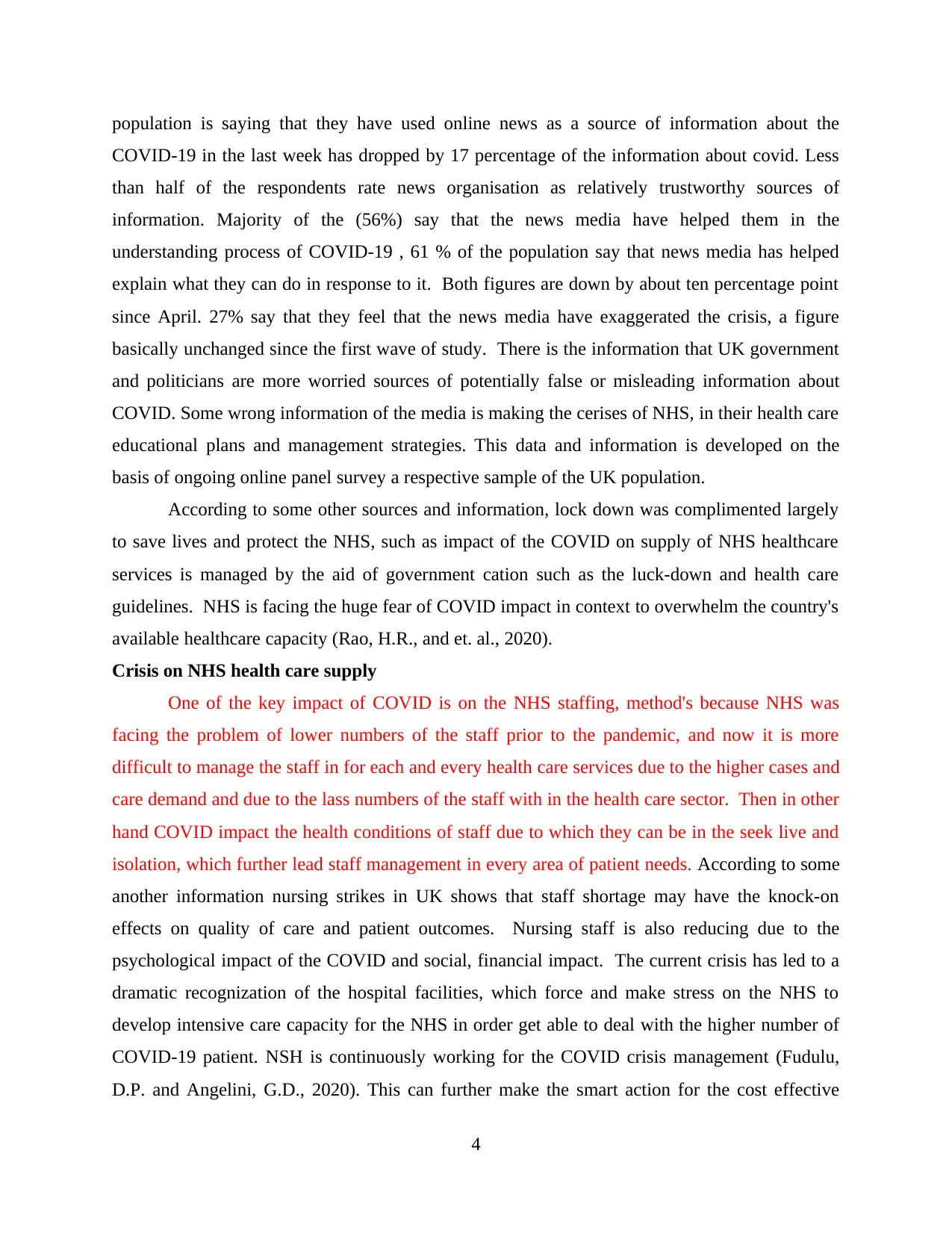
population is saying that they have used online news as a source of information about the
COVID-19 in the last week has dropped by 17 percentage of the information about covid. Less
than half of the respondents rate news organisation as relatively trustworthy sources of
information. Majority of the (56%) say that the news media have helped them in the
understanding process of COVID-19 , 61 % of the population say that news media has helped
explain what they can do in response to it. Both figures are down by about ten percentage point
since April. 27% say that they feel that the news media have exaggerated the crisis, a figure
basically unchanged since the first wave of study. There is the information that UK government
and politicians are more worried sources of potentially false or misleading information about
COVID. Some wrong information of the media is making the cerises of NHS, in their health care
educational plans and management strategies. This data and information is developed on the
basis of ongoing online panel survey a respective sample of the UK population.
According to some other sources and information, lock down was complimented largely
to save lives and protect the NHS, such as impact of the COVID on supply of NHS healthcare
services is managed by the aid of government cation such as the luck-down and health care
guidelines. NHS is facing the huge fear of COVID impact in context to overwhelm the country's
available healthcare capacity (Rao, H.R., and et. al., 2020).
Crisis on NHS health care supply
One of the key impact of COVID is on the NHS staffing, method's because NHS was
facing the problem of lower numbers of the staff prior to the pandemic, and now it is more
difficult to manage the staff in for each and every health care services due to the higher cases and
care demand and due to the lass numbers of the staff with in the health care sector. Then in other
hand COVID impact the health conditions of staff due to which they can be in the seek live and
isolation, which further lead staff management in every area of patient needs. According to some
another information nursing strikes in UK shows that staff shortage may have the knock-on
effects on quality of care and patient outcomes. Nursing staff is also reducing due to the
psychological impact of the COVID and social, financial impact. The current crisis has led to a
dramatic recognization of the hospital facilities, which force and make stress on the NHS to
develop intensive care capacity for the NHS in order get able to deal with the higher number of
COVID-19 patient. NSH is continuously working for the COVID crisis management (Fudulu,
D.P. and Angelini, G.D., 2020). This can further make the smart action for the cost effective
4
COVID-19 in the last week has dropped by 17 percentage of the information about covid. Less
than half of the respondents rate news organisation as relatively trustworthy sources of
information. Majority of the (56%) say that the news media have helped them in the
understanding process of COVID-19 , 61 % of the population say that news media has helped
explain what they can do in response to it. Both figures are down by about ten percentage point
since April. 27% say that they feel that the news media have exaggerated the crisis, a figure
basically unchanged since the first wave of study. There is the information that UK government
and politicians are more worried sources of potentially false or misleading information about
COVID. Some wrong information of the media is making the cerises of NHS, in their health care
educational plans and management strategies. This data and information is developed on the
basis of ongoing online panel survey a respective sample of the UK population.
According to some other sources and information, lock down was complimented largely
to save lives and protect the NHS, such as impact of the COVID on supply of NHS healthcare
services is managed by the aid of government cation such as the luck-down and health care
guidelines. NHS is facing the huge fear of COVID impact in context to overwhelm the country's
available healthcare capacity (Rao, H.R., and et. al., 2020).
Crisis on NHS health care supply
One of the key impact of COVID is on the NHS staffing, method's because NHS was
facing the problem of lower numbers of the staff prior to the pandemic, and now it is more
difficult to manage the staff in for each and every health care services due to the higher cases and
care demand and due to the lass numbers of the staff with in the health care sector. Then in other
hand COVID impact the health conditions of staff due to which they can be in the seek live and
isolation, which further lead staff management in every area of patient needs. According to some
another information nursing strikes in UK shows that staff shortage may have the knock-on
effects on quality of care and patient outcomes. Nursing staff is also reducing due to the
psychological impact of the COVID and social, financial impact. The current crisis has led to a
dramatic recognization of the hospital facilities, which force and make stress on the NHS to
develop intensive care capacity for the NHS in order get able to deal with the higher number of
COVID-19 patient. NSH is continuously working for the COVID crisis management (Fudulu,
D.P. and Angelini, G.D., 2020). This can further make the smart action for the cost effective
4
⊘ This is a preview!⊘
Do you want full access?
Subscribe today to unlock all pages.

Trusted by 1+ million students worldwide
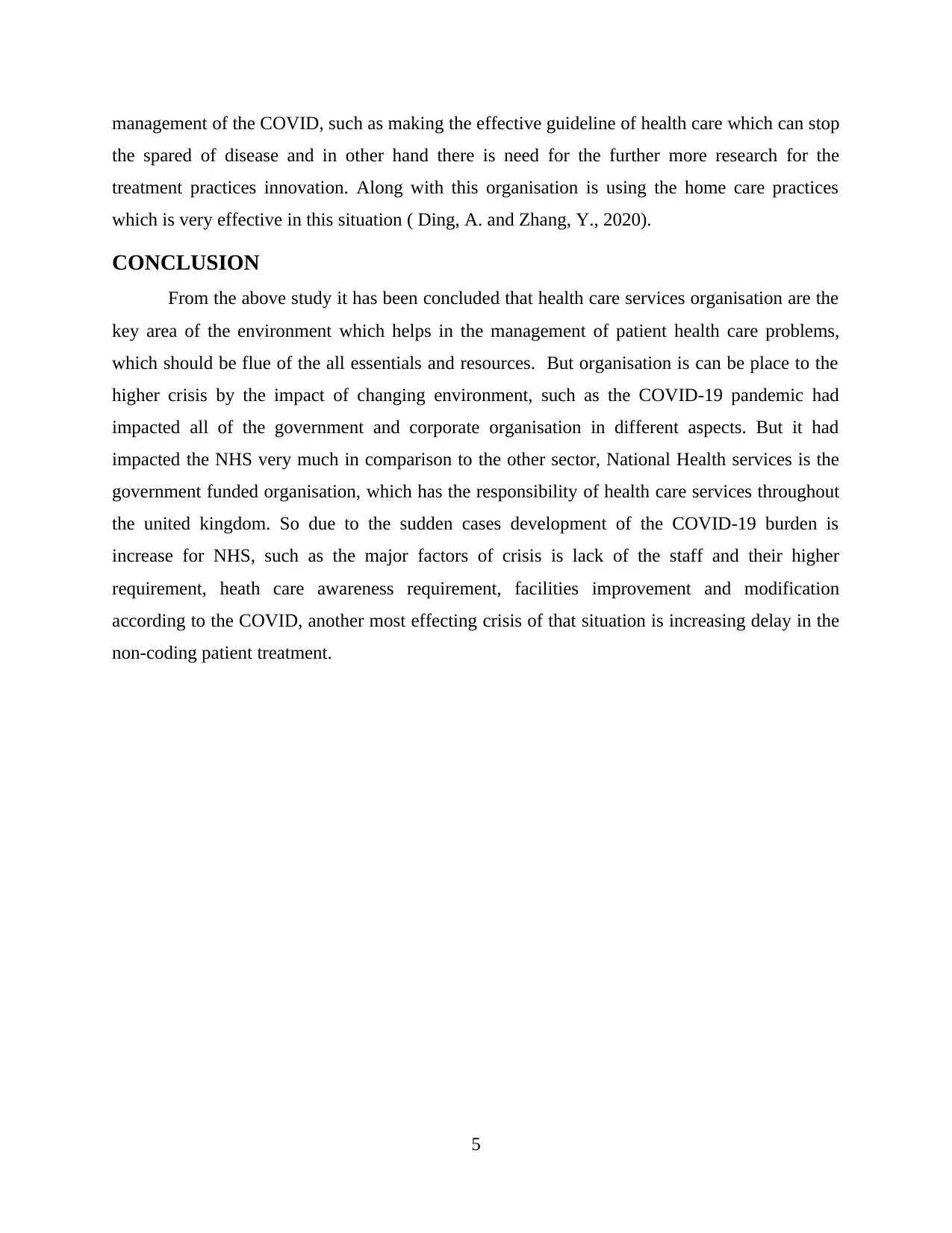
management of the COVID, such as making the effective guideline of health care which can stop
the spared of disease and in other hand there is need for the further more research for the
treatment practices innovation. Along with this organisation is using the home care practices
which is very effective in this situation ( Ding, A. and Zhang, Y., 2020).
CONCLUSION
From the above study it has been concluded that health care services organisation are the
key area of the environment which helps in the management of patient health care problems,
which should be flue of the all essentials and resources. But organisation is can be place to the
higher crisis by the impact of changing environment, such as the COVID-19 pandemic had
impacted all of the government and corporate organisation in different aspects. But it had
impacted the NHS very much in comparison to the other sector, National Health services is the
government funded organisation, which has the responsibility of health care services throughout
the united kingdom. So due to the sudden cases development of the COVID-19 burden is
increase for NHS, such as the major factors of crisis is lack of the staff and their higher
requirement, heath care awareness requirement, facilities improvement and modification
according to the COVID, another most effecting crisis of that situation is increasing delay in the
non-coding patient treatment.
5
the spared of disease and in other hand there is need for the further more research for the
treatment practices innovation. Along with this organisation is using the home care practices
which is very effective in this situation ( Ding, A. and Zhang, Y., 2020).
CONCLUSION
From the above study it has been concluded that health care services organisation are the
key area of the environment which helps in the management of patient health care problems,
which should be flue of the all essentials and resources. But organisation is can be place to the
higher crisis by the impact of changing environment, such as the COVID-19 pandemic had
impacted all of the government and corporate organisation in different aspects. But it had
impacted the NHS very much in comparison to the other sector, National Health services is the
government funded organisation, which has the responsibility of health care services throughout
the united kingdom. So due to the sudden cases development of the COVID-19 burden is
increase for NHS, such as the major factors of crisis is lack of the staff and their higher
requirement, heath care awareness requirement, facilities improvement and modification
according to the COVID, another most effecting crisis of that situation is increasing delay in the
non-coding patient treatment.
5
Paraphrase This Document
Need a fresh take? Get an instant paraphrase of this document with our AI Paraphraser
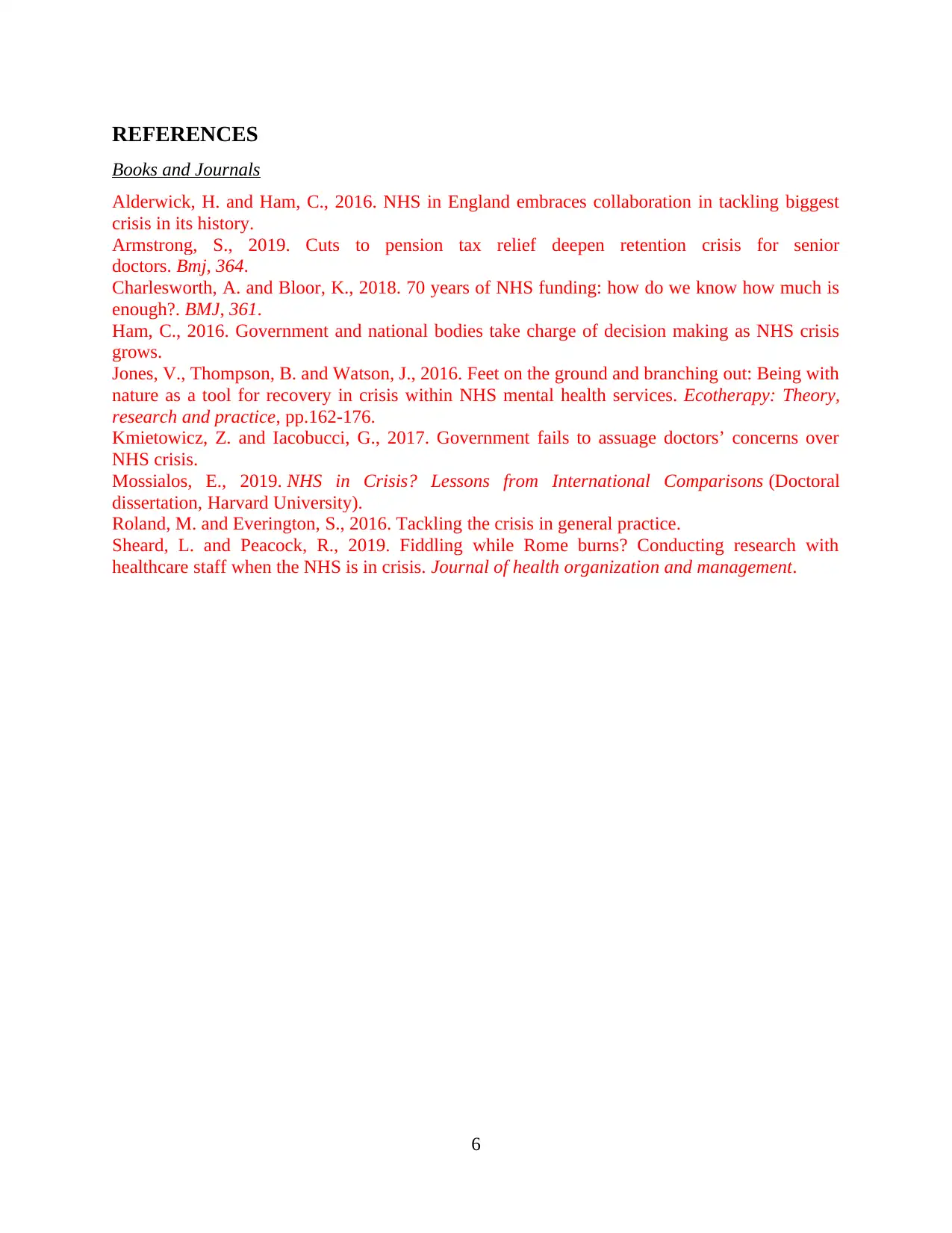
REFERENCES
Books and Journals
Alderwick, H. and Ham, C., 2016. NHS in England embraces collaboration in tackling biggest
crisis in its history.
Armstrong, S., 2019. Cuts to pension tax relief deepen retention crisis for senior
doctors. Bmj, 364.
Charlesworth, A. and Bloor, K., 2018. 70 years of NHS funding: how do we know how much is
enough?. BMJ, 361.
Ham, C., 2016. Government and national bodies take charge of decision making as NHS crisis
grows.
Jones, V., Thompson, B. and Watson, J., 2016. Feet on the ground and branching out: Being with
nature as a tool for recovery in crisis within NHS mental health services. Ecotherapy: Theory,
research and practice, pp.162-176.
Kmietowicz, Z. and Iacobucci, G., 2017. Government fails to assuage doctors’ concerns over
NHS crisis.
Mossialos, E., 2019. NHS in Crisis? Lessons from International Comparisons (Doctoral
dissertation, Harvard University).
Roland, M. and Everington, S., 2016. Tackling the crisis in general practice.
Sheard, L. and Peacock, R., 2019. Fiddling while Rome burns? Conducting research with
healthcare staff when the NHS is in crisis. Journal of health organization and management.
6
Books and Journals
Alderwick, H. and Ham, C., 2016. NHS in England embraces collaboration in tackling biggest
crisis in its history.
Armstrong, S., 2019. Cuts to pension tax relief deepen retention crisis for senior
doctors. Bmj, 364.
Charlesworth, A. and Bloor, K., 2018. 70 years of NHS funding: how do we know how much is
enough?. BMJ, 361.
Ham, C., 2016. Government and national bodies take charge of decision making as NHS crisis
grows.
Jones, V., Thompson, B. and Watson, J., 2016. Feet on the ground and branching out: Being with
nature as a tool for recovery in crisis within NHS mental health services. Ecotherapy: Theory,
research and practice, pp.162-176.
Kmietowicz, Z. and Iacobucci, G., 2017. Government fails to assuage doctors’ concerns over
NHS crisis.
Mossialos, E., 2019. NHS in Crisis? Lessons from International Comparisons (Doctoral
dissertation, Harvard University).
Roland, M. and Everington, S., 2016. Tackling the crisis in general practice.
Sheard, L. and Peacock, R., 2019. Fiddling while Rome burns? Conducting research with
healthcare staff when the NHS is in crisis. Journal of health organization and management.
6
1 out of 8
Related Documents
Your All-in-One AI-Powered Toolkit for Academic Success.
+13062052269
info@desklib.com
Available 24*7 on WhatsApp / Email
![[object Object]](/_next/static/media/star-bottom.7253800d.svg)
Unlock your academic potential
Copyright © 2020–2026 A2Z Services. All Rights Reserved. Developed and managed by ZUCOL.




